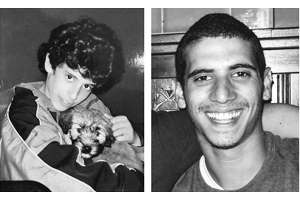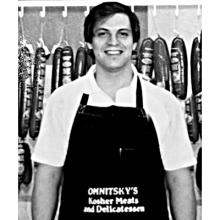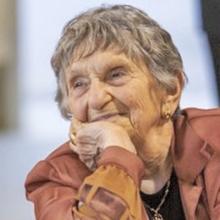Obituaries
KOBY AIDEN SHUSTER September 29, 1989 – May 27, 2020
 Koby was not your average human.
Koby was not your average human.
He was precocious, charismatic, genuine, articulate, caustic, determined. He could be sweet and caring. He could be provocative. He could be sly. As a child, he read early. He watched Fantasia religiously. He was a notorious mouth-open eater and an idiosyncratic toe-walker.
He began to play classical guitar when he was five years old, swiftly surpassing his father’s abilities. His phenomenal vocabulary emerged effortlessly and often baffled his peers. Later, when he studied Criminology at SFU, he would dissect slower students’ feeble arguments with ease. He would produce excellent work if he felt like it or subtly infuse an unappealing assignment with derisive humour. On the soccer field, he was a wrecking ball.
He loved his family and friends, and he especially treasured his grandparents, Lawrence and Eddy Werier, who encouraged him to colour outside the lines. When he wanted to accomplish something, however difficult, he found his focus. He claimed his Jewish heritage despite being born into a secular household. He decided that he would have a bar mitzvah and learned how to read the Hebrew alphabet in a week. During later travel in Israel, he felt that he had come home.
Koby kindled a deep relationship with music. He bewitched the bass guitar. He found kinship in artists who circumvent norms, from Tech N9ne to RATM (who he was so excited to see in concert again before Covid-19 hit) to Shuggie Otis to Run the Jewels. He held a deep abiding love for southern hip-hop. His band, Dust, enjoyed significant high school fame. Koby made many deep bonds with musicians of all backgrounds and had an uncanny ability to connect with and support others through music.
Koby was a sage of sorts. He would never mince words or participate in cheap generosity. His caring was raw and true. If he saw that you needed support, he would help, but if you were being overly dramatic, he had no sympathy for that. His challenging words were often an invitation to play or discover truth. In another time period he might have been a lauded orator or philosopher.
People were drawn to him. His presence had an orbit. Koby’s charisma was irresistible, and he loved to have a good time. He could get his way so naturally because his magnetism was bound with a respect for others’ boundaries. Despite his omnipresent independence, he could make others feel at ease with a caring look or an honest, incisive observation. He said what was needed in the moment, and he expected others to speak honestly to him. He was a secret-keeper for many people and held this position as a sacred trust.
Koby understood darkness, and it understood him. He experienced trauma from losing several beloved friends to addiction, which hardened him against himself and fueled his own substance abuse. He never recovered from the guilt of believing he was responsible, even though he wasn’t. He knew himself so well, and yet he was never able to forgive himself.
Koby suffered deeply but was too proud to accept help. His identity was bound up in making it without outside support. His web of mental health struggles grew over the years.
Sometimes when you tie a knot very tightly, you can’t untie it again.
Koby’s death was an accidental overdose. He was in his small apartment, in the bath. He loved to soak in the tub. He was sick of anxiety and tired of being afraid, but he didn’t want to die. He was a suffering guy who did some bad dope. It’s ironic that what got Koby in the end was the insidiousness of fentanyl.
It’s important to understand that Koby never gave up his honour. He put those close to him through heartache, but he was also very loyal and loving. In his last text to his Mom a few days before he died he told her he loved her. He did that all the time.
He made a point of not implicating others in his actions. He lived fast and with so much heart. He rejected dull moments. Some of his exploits had a legendary quality that only he was capable of generating. Those fortunate enough to be beneficiaries of his gifts in this life know how blessed they are.
He is survived by his mother Jodie Werier, father Michael Shuster, grandparents Lawrence and Eddy Werier, nanny and second mom Augustina (Olive) Johnpierre, Ziggy, the dog that made his eyes itchy, and his extended family of neighbours and friends on the block that he grew up on and beyond.
We don’t want flowers. They make us sneeze. Please contribute to a charity that supports mental health and addiction. They go hand in hand. And please take the time to know and love yourself enough that you can live how you want but also have the resolve to care well for yourself.
Obituaries
ALAN JEFFREY RAPPAPORT

With much love and sadness, we mourn the passing of Alan Jeffrey Rappaport who died at the age of 72 on July 1, 2025.
Alan was predeceased by his parents – Sidney and Elaine Rappaport. He is survived by his former wife, Lynnie and their children Amy (Josh Bloomfield) and Lissie (Tamir Bourlas), grandchildren Aiden, Olivia, Shai and Aviya, his sister Bonny Leszcz (Molyn), brother Eppy (Ellen), brother Danny (Marcy), and many nieces, nephews and niblings.
Alan was born in Brooklyn, NY. He lived in Pennsylvania and California before moving to Winnipeg at the age of 14 when his father accepted a position as head rabbi at the Rosh Pina Synagogue. He earned an accounting degree at the University of Manitoba and became a Certified Chartered Accountant. An entrepreneur at heart, he went on to become co-owner of Omnitsky Kosher with his brother Eppy.
Alan was a gifted athlete. He had a sharp intellect (particularly with numbers). He played a great game of pool, poker and golf. He was well loved for his sense of adventure. He knew how to live large and did so in the first part of his life.
Alan had a significant stroke at the age of 48 when he lost the use of his left side. The latter part of his life was marked by adjusting to disability. He learned to live with less and appreciate ordinary everyday delights – a riveting murder mystery, a corned beef sandwich, a Blue Jays game.
The family would like to thank the staff of the Simkin Centre for the care he received in his final years.
If desired, memorial donations can be made to: Saul and Claribel Simkin Centre or Bruce Oake Recovery Centre.
Obituaries
JACOB (JACK) KLEIMAN FEBRUARY 8, 1927 – AUGUST 19, 2024

It was with great sorrow that we announced the passing of Jacob (Jack) Kleiman (Jacob ben Moishe) on Monday August 19, 2024 (16, Av) in his 98th year.
He was predeceased by his parents, Maurice and Rose Kleiman, his brother, Harvey, and his sisters, Florence (the late Louis Selby), Betty (the late Joseph Gilfix) and Ruth (the late Ben Aisenstat). He is survived by his sister Ann of Bethesda, U.S.A. (the late Harold Eist). He will be missed by his many nephews, nieces, grandnephews, grand-nieces, great-grandnephews, and great-grandnieces.
Jack’s maternal grandparents were among the pioneer families established in the then Hirsch Colony (founded 1892) by the Jewish Colonization Association in the Southeast corner of Saskatchewan. Jack and his late brother Harvey lived and farmed on the same land purchased by their parents in the area.
In later years he and his brother developed many business interests: initially farm implement and automotive sales and later oil exploration companies including Poplar Developments Ltd., drilling locally. They were well known in the surrounding community and were generous supporters of local charitable initiatives such as the Estevan General Hospital.
Jack and his brother were the last Jewish farmers in the Hirsch area and over the years were the subject of many literary articles and television interviews. Jack and his brother helped to maintain the Jewish cemetery in the Hirsch area until it was taken over as a historical site by the province. Due to advancing age, the family farm was sold in 2016 and both retired to Calgary to be nearer to family. This marked the closing of one chapter of Jewish history in Canada.
Jack was a talented mechanic who remained married to the land and devoted to his family. He was ever of good spirit. Although frail in body, Jack remained active mentally and involved in life until the end being always interested in the happenings of his extended family.
It is hard to adequately sum up a long life marked by both hard work, dedication to family, and good humour. The entire family remember him and honour him with love, affection, and good memories.
The family wishes to thank the many friends and neighbours in the Estevan area who provided help and support during his last years and especially to his dedicated care givers in Calgary.
The funeral was held in Calgary on August 22, 2024, at the Chevra Kadisha Chapel with interment at the 37th Street Jewish Cemetery.
The unveiling will take place on July 27, 2025 at 11:30 AM at the same location. Donations may be made in Jack’s memory to the charity of your choice.
Obituaries
EDITH LANDY

June 30, 1920 – July 2, 2025
After a long and fulfilling life, our Mother passed on July 2, 2025. Born in Winnipeg, she grew up as part of a large extended family.
Mother was predeceased by her parents, Joseph Mayer Freiden and Rivka (nee Fordman), our father, David Landy, and her sisters Syma Katz and Jennie Rich. Edith is survived by her five children and their families: Laurie Landy and Nora Spinks, Barbara and Paul Livingston, Bob and Rhonda Landy, Mark Landy and Jenifer, and Martin Landy, her grandchildren Saralyn, Adam, Alex, Joshua, Ethan, Caitlin, David, Alicia, Lily, and six great-grandchildren, her cousins Norma Chernick and Shlomo Mayman and her many friends and relatives.
Mom grew up as part of a large extended family in the North End of Winnipeg, guided by her father’s values of service, community and the importance of family. She entered the School of Nursing at the Winnipeg General Hospital, now the Health Sciences Centre. She progressed from general duty nurse to nursing supervisor and served as the Assistant Director of Nursing for 15 years until her retirement in 1983. Over the course of her five-decade nursing career, she raised five children, managed a household, cared for many extended family members and remained actively involved in the community.
Community was a foundation of Mom’s life. Mom was very proud of her volunteering at the Winnipeg International Children’s Festival, Winnipeg Folk Fest and other community events. She and David were patrons of the arts, including the Royal Winnipeg Ballet, the Royal Manitoba Theatre Centre and the Manitoba Opera. In 2024, she was recognized as the longest continuous subscriber to the Winnipeg Symphony Orchestra.
The North Centennial Seniors Association played an important role in our parents’ later years. She ran her kitchen crew, supervised Hot Dog Day and provided food for many bus trips. Mom’s legacy was the Grandma Grandpa Swim Club, which she established, raised funds for, and built into a strong organization.
After a long and remarkable life of service and giving care, Mom accepted the need to receive care. The Family would like to thank Melita and Nelissa for their care and dedication, as well as the staff of the Simkin Centre, especially on Weinberg 2.
We cannot put into words how much she will be missed.
In lieu of flowers, donations can be sent to the Joseph Freiden Scholarship for Jewish Studies at the Jewish Foundation of Manitoba.
A service was held July 4, 2025, at Chesed Shel Emes – Winnipeg.
